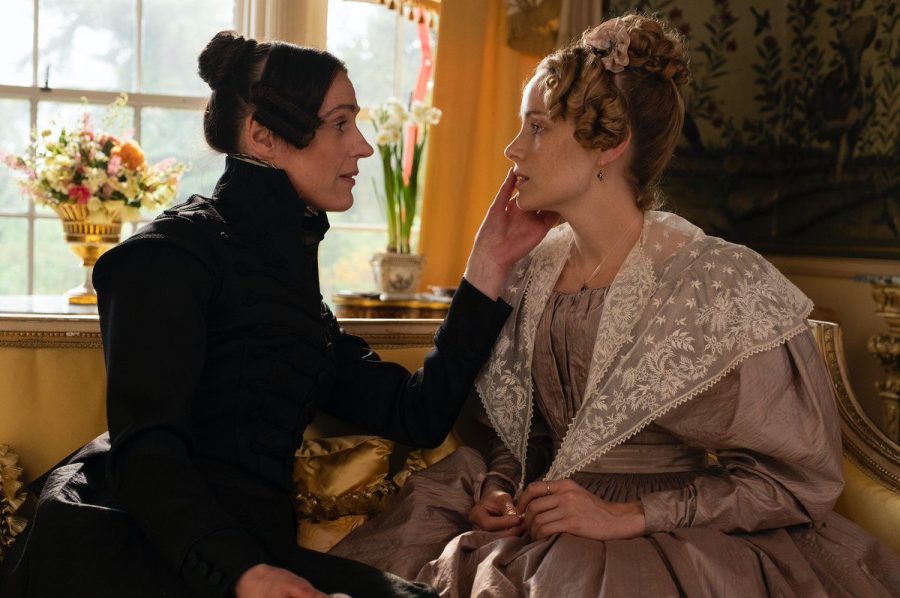In a smash-hit first season, “Gentleman Jack” gives audiences a raw, vulnerable look at the butch life and times of history’s “first modern lesbian.”
Billed as a simple work of historical fiction based on the diaries of “first modern lesbian” Anne Lister, one could be forgiven for going into the series lightly. Many viewers, myself included, picked it up after the season two finale of “Killing Eve,” simply hoping for more women falling for women on their screens. The deeply aching, beautifully rendered portrait of butch lesbian vulnerability that “Gentleman Jack” provides caught audiences off guard. As a butch viewer in particular, every episode felt like being spoken to personally. It was as though Lister herself was telling you that she’d lived your life, and you would be fine.
“Gentleman Jack” is, quite frankly, an absolute masterwork of lesbian television.
Anne Lister (Suranne Jones) is perfectly real in every mannerism, from her tough, masculine stride in the streets of Yorkshire to the hasty way she loosens her cravat before making love to a woman. When she casts her glance into the camera (a move recalling Phoebe Waller-Bridge’s “Fleabag”), you feel as though you have been let in on a secret — that you are the only person in the room who knows what she is really talking about. Love interest Ann Walker (Sophie Rundle) originally seems placid and naive in comparison to Lister, cosseted by older relatives and confined from society at large. Of course, she too contains hidden depths. Both characters undergo a powerful awakening over the course of the series, in which they realize simultaneously what a lesbian life can be.
“Gentleman Jack” is rare in its portrayal of a butch woman in that it goes beyond shallow, stern stereotype with regard to Lister. Her firm exterior gives way, in private, to raw, sharp emotion. We see her sob over the women who continue to choose marriage to men over relationships with her — relationships that Lister treats with devotion and commitment and that her lovers view as flings. We see her rage, time and again, over the quintessentially Victorian condescension of the men in her life, and the way that attitude often gives way to the abuse of women at their hands. A repeated motif for Lister, and for butches since time immemorial, is the line, “I’m always okay.” This leads us, in the finale, to Lister offering Walker her heart in her hands on a windy hillside, confessing, “Don’t hurt me. I’m not as strong as you think. Well, I am, obviously. But sometimes I’m not.” Both of these sides of Lister are treated as authentic parts of her personhood. Her butchness is not reduced to a façade because she has feelings. Her feelings are not played off as pretension because she is butch.
Crucially, we also see Lister’s joy. We see her triumphs, her delights, and we see her giddy as a schoolgirl over a new love. In a world of ever-increasing LGBT representation on television, this is still, somehow, a thrilling surprise. There are no buried lesbians to be had here; no one is killed off or brutally abused for shock value. Though the series deals with homophobia and lesbian pain in a very real way, Lister’s life consistently comes up roses in the end, culminating in a depiction of her real-life union to Walker in the city of York’s Holy Trinity Church in 1832. It’s fascinating that in 2019, a nineteenth-century period piece is one of the only shows to give audiences a happy ending (and presumably, a happy future) for lesbian women.
Where does all of this leave us for season two? Audiences might naturally worry that Lister’s seduction of Walker has already met its climax, in every sense of the term. Blessedly, the real Anne Lister left behind over four million words of diary entries, and the fictional one left us, in the series finale, on the cusp of her new life as a wedded woman. Ann Walker and Anne Lister have just picked up the pen to write the blueprint for living in a lesbian marriage, nearly two hundred years before such a concept would become commonly conceived-of by the general public. As their relationship steps into “Gentleman Jack’s” centermost spotlight, we can only hope for more of the depth and honesty of feeling that made season one so extraordinarily compelling. Next year can’t come quickly enough.
Grade: A+
Director: Sally Wainwright
Starring: Suranne Jones, Sophie Rundle
Premiered: Apr 22, 2019 on HBO
Image courtesy of themarysue.com.














